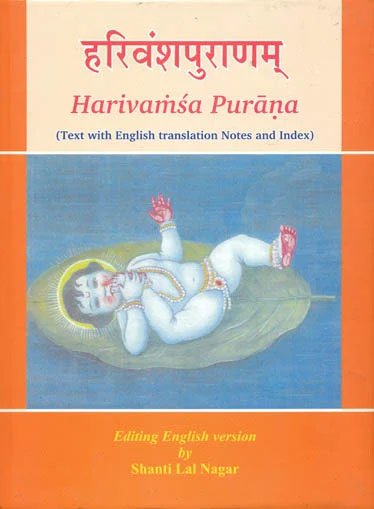Harivamsha Purana
by Manmatha Nath Dutt | 1897 | 293,872 words | ISBN-10: 8178542188 | ISBN-13: 9788178542188
This page is entitled “the story of satyavrata (continued)” and represents Chapter 13 of the first book (‘Adi Parva’) of the Harivamsa (English translation in Prose). The Harivamsha Purana narrates the lineage and life-story of Krishna (Hari). Although not officially mentioned in the list of Puranas, this book includes topics such as geology, creation theory, time (manvantaras), ancient historical legends and accounts of royal dynasties.
Chapter 13 - The Story of Satyavrata (continued)
1. Vaishampayana said:—Thus on account of his Bhakti, mercy and promise[1] Satyavrata, ever stationed in humility, took charge of Vishvamitra’s offspring.
2. Having killed wild deer, bear and buffaloes he used to keep meat tied to the trees near the hermitage of Vishvamitra.
3. After the king had left for the forest he, taking the vow of not taking another’s wife, passed twelve years at the behest of his sire as a probationer.
4. On account of his being the royal priest the ascetic Vashishtha protected the city of Ayodhya and the kingdom.
5. Satyavrata too, on account of his childishness and future greatness, foolishly got greatly enraged with Vashishtha.
6. O king, when his father renounced his own son Satyavrata, Vashishtha, for some reason, did not prevent him..
7. By proceeding seven footsteps all the nuptial mantras are annulled. Satyavrata, however, could not hear those muttering prayers.
8. O descendant of Bharata, thinking "although Vashishtha is pious still he is not saving me" Satyavrata got highly enraged with him.
9. Thinking well however the great Vashishtha did not prevent him then; but Satyavrata could not understand his intention.
10. His high-souled sire was not satisfied with him and therefore the slayer of Paka did not send showers for twelve years.
11. By carrying on those hard austerities now on earth he is releasing his family (from that sin).
12. When he was forsaken by his father Vashishtha did not prevent him because the ascetic had in view of placing his (Satyavrata’s) son on the throne.
13-14. Carrying on hard austerities for twelve years, one day the powerful prince Satyavrata, stricken with anger, ignorance, labour and hunger, for not finding meat, saw the high-souled Vashishtha’s milch-cow conferring the grant of all desires.
15. O Janamejaya, possessed by drunkenness, madness, exhaustion, anger, hunger, hastiness, cowardice, avarice and lust he killed that cow.
16. He himself took the meat and made Vishvamitra’s children partake of it. Hearing it Vashishtha was enraged. The revered Rishi, worked up with anger, then said to the prince. "
17. O wicked man, I discharge at you this javelin (of sin); if you had not two other javelins of sin (stuck to you) forsooth I would not have discharged it[2].
18. You have committed threefold transgressions, namely the incurring of your father’s displeasure, the killing of your preceptor’s milch-cow and the eating of forbidden meat".
19. Vaishampayana said:—The incurring of his father’s displeasure, the killing of his preceptor’s cow and the eating of forbidden meat formed as it were three javelins to him and therefore he was called Trishankhu.
20. After his return Vishvamitra found his wife and children looked after by him and pleased accordingly the ascetic conferred a boon on Trishankhu.
21. When that ascetic was about to confer a boon on him the prince begged of him (the boon) of going bodily to heaven.
22. Then the fear of draught, extending over twelve years, was gone and the ascetic, having installed him on the throne, began to act as his priest.
23. The all-powerful son of Kushika took him bodily to heaven in the presence of all the gods and the great saint Vashishtha.
24. He had a wife by name Satyaratha born in the race of Kekayas. He begat on her the sinless prince Harishcandra.
25. The king Harishcandra was called Traishankava.[3] Having celebrated a a Rajasuya sacrifice he became the Lord Paramount.
26. Harishcandra had a powerful son by name Rohita by whom, for the advancement of his kingdom, the city of Rohitapura was founded.
27. Having governed his kingdom and the subjects and been convinced of the worthlessness of the world the royal saint (Rohita) gave away that city unto the Brahmanas.
28. Rohita’s son was Harita, whose son was Chanchu who had two sons, by name Vijaya and Sudeva.
29. Vijaya defeated all the Kshatryas and therefore he got that name. His son was Ruruka who was virtuous-souled and studied the Vedas.
30-31. Ruruka’s son was Vrika and of him was born Vahu. Haihaya, Talajangha and other Kshatriya clans accompanied by Shaka, Javana, Kamvoja, Parada Palhava and other clans discomfitted that king for he was not greatly virtuous even in golden age.
32. Vahu’s son was born with poison and therefore he was called Sagara. Coming to the hermitage of Aurva he was protected by Bhargava.
33-34. O foremost of Kurus, having obtained a fiery weapon from Bhargava the pious king Sagara, endued with great strength, slew all the Haihayas and Talajanghas, conquered all the world and put down the religious practices of Shaka, Palhava and Parada Kshatryas.
Footnotes and references:
[1]:
The promise refers to that of his no longer being a disciple of Vashishtha.
[2]:
This passage requires a little elucidation. He had already been visited by two transgressions, namely the incurring of his father’s displeasure and the killing of his preceptor’s cow. Now he commits another transgression, namely the eating of forbidden meat—these three transgressions are compared to three javelins.
[3]:
The son of Trishankhu.
